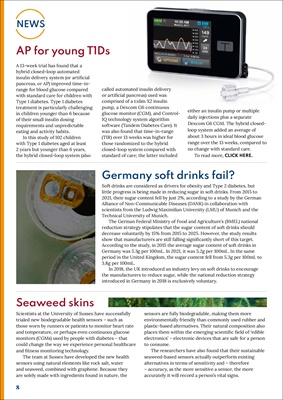
8
NEWS
AP for young T1Ds
A 13-week trial has found that a
hybrid closed-loop automated
insulin delivery system (or artificial
pancreas, or AP) improved time-inrange
for blood glucose compared
with standard care for children with
Type 1 diabetes. Type 1 diabetes
treatment is particularly challenging
in children younger than 6 because
of their small insulin dosing
requirements and unpredictable
eating and activity habits.
In this study of 102 children
with Type 1 diabetes aged at least
2 years but younger than 6 years,
the hybrid closed-loop system (also
either an insulin pump or multiple
daily injections plus a separate
Dexcom G6 CGM. The hybrid closedloop system added
an average of
about 3 hours in ideal blood glucose
range over the 13 weeks, compared to
no change with standard care.
To read more, CLICK HERE.
Germany soft drinks fail?
Soft drinks are considered as drivers for obesity and Type 2 diabetes, but
little progress is being made in reducing sugar in soft drinks. From 2015 to
2021, their sugar content fell by just 2%, according to a study by the German
Alliance of Non-Communicable Diseases (DANK) in collaboration with
scientists from the Ludwig Maximilian University (LMU) of Munich and the
Technical University of Munich.
The German Federal Ministry of Food and Agriculture's (BMEL) national
reduction strategy stipulates that the sugar content of soft drinks should
decrease voluntarily by 15% from 2015 to 2025. However, the study results
show that manufacturers are still falling significantly short of this target.
According to the study, in 2015 the average sugar content of soft drinks in
Germany was 5.3g per 100mL. In 2021, it was 5.2g per 100mL. In the same
period in the United Kingdom, the sugar content fell from 5.3g per 100mL to
3.8g per 100mL.
In 2018, the UK introduced an industry levy on soft drinks to encourage
the manufacturers to reduce sugar, while the national reduction strategy
introduced in Germany in 2018 is exclusively voluntary.
called automated insulin delivery
or artificial pancreas) used was
comprised of a t:slim X2 insulin
pump, a Dexcom G6 continuous
glucose monitor (CGM), and ControlIQ
technology system algorithm
software (Tandem Diabetes Care). It
was also found that time-in-range
(TIR) over 13 weeks was higher for
those randomized to the hybrid
closed-loop system compared with
standard of care; the latter included
Seaweed skins
Scientists at the University of Sussex have successfully
trialed new biodegradable health sensors - such as
those worn by runners or patients to monitor heart rate
and temperature, or perhaps even continuous glucose
monitors (CGMs) used by people with diabetes - that
could change the way we experience personal healthcare
and fitness monitoring technology.
The team at Sussex have developed the new health
sensors using natural elements like rock salt, water
and seaweed, combined with graphene. Because they
are solely made with ingredients found in nature, the
sensors are fully biodegradable, making them more
environmentally friendly than commonly used rubber and
plastic-based alternatives. Their natural composition also
places them within the emerging scientific field of 'edible
electronics' - electronic devices that are safe for a person
to consume.
The researchers have also found that their sustainable
seaweed-based sensors actually outperform existing
alternatives in terms of sensitivity and - therefore
- accuracy, as the more sensitive a sensor, the more
accurately it will record a person's vital signs.